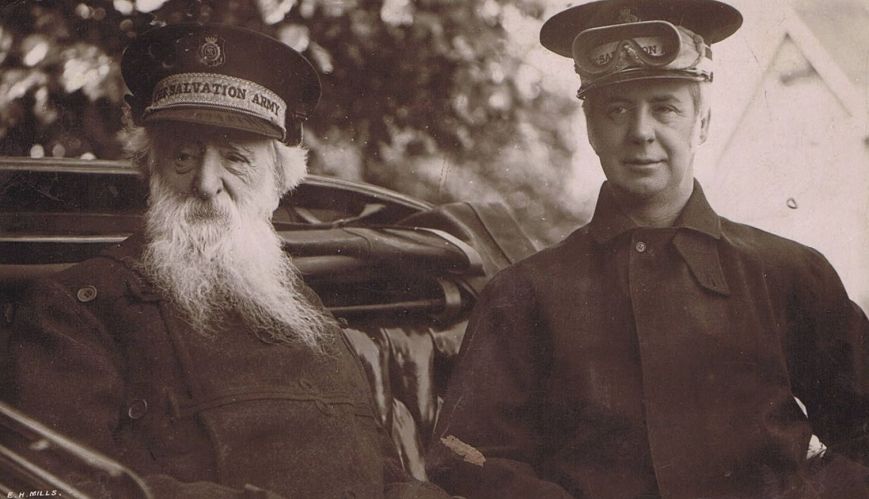A soldier as General of The Salvation Army?

A soldier as General of The Salvation Army?
General William Booth and his son Bramwell during a motor tour. Bramwell Booth never had an officer rank, yet was chosen by Booth as his successor.
It is an oddity of The Salvation Army that the General, like any officer, is a soldier, with their name on the Soldiers’Roll of the corps they choose to attend. The General, therefore, is a soldier! Yet, while officers are soldiers, only a soldier who is also an officer can be nominated for the election of General. This has not always been the case.
William Booth was reputed to have stated, “I cared little then or afterwards for ecclesiastical creeds or forms”and in light of this, he did not limit his choice of successor. In an early Army deed, it stated that, “William Booth and every general superintendent who should succeed him should have power to appoint his successor to the office of general superintendent and all the rights of powers and authorities of the office should vest in the person ...”
There was nothing to limit the General’s choice to an officer. In fact, William Booth’s choice, his son William Bramwell Booth, never held an officer rank, he was only known as “Mr Bramwell”or “Chief of the Staff”.
While The Salvation Army Act 1931 removed the right of the General to nominate their successor, it did not remove the right of a soldier to be elected General. In “Schedule, Point 12”, the document stated, “The person so to be elected may be either one of the members of the high council or some other person.”
Subsequent Acts have changed elements of the Army’s constitution, but The Salvation Army Act 1980 revoked, repealed or amended elements of all previous Acts and Deed Polls and changed the status of officers and soldiers. This change is not outlined in any history book, yet is one of the points of interest in Army history.
The change under consideration is “Schedule 4, Part V, 13 (b)”, which states that, “No person other than an officer shall be eligible for election as General.”This means that from 1980 only officers can be elected General and has, in part, created an “ecclesiastical creed”or a “priestly tribe”, excluding all others.
Not only is this position closed to soldiers, but General John Larsson, in his book Inside A High Council infers that the administration tasks of clerks and recorders for the High Council are also reserved for officers. The only area where a non-officer can be included in a High Council is the “adjudication”process, to work through the eligibility of those attending, or other legal matters.
Can a non-officer be elected as General? The short answer is no. However, there is another way a person untrained as an officer could sit on the High Council and become General.
“Point 5”of the 1980 Act states that the General can, “appoint or promote any persons to any office or rank in the Army.”In this way, the General could appoint a soldier to become a Territorial Commander, give them the rank of Colonel or higher and having met the other requirements be summoned to the High Council.
Once on the High Council, they could be nominated and receive the votes for the generalship. Although highly unlikely, it could legally happen. It is not a soldier becoming the General, but the closest the 1980 Act would now allow.
This article was produced with assistance from the London and Melbourne Salvation Army Heritage Centres.